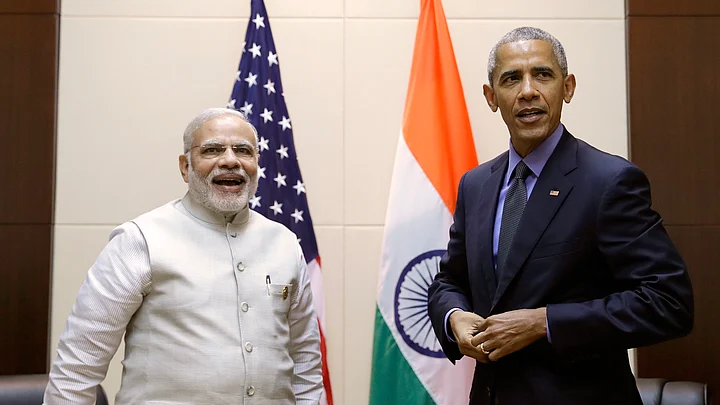Prime Minister Narendra Modi, at the 14th Association of South East Asian Nations summit in Laos, hit out at Pakistan, calling it the “instigator” of terror, without explicitly naming the country.
One country in our neighbourhood, whose competitive advantage rests solely in producing and exporting terrorism… The time has come to isolate and sanction ‘this’ instigator.
This is the second time the Prime Minister has spoken out against Pakistan. At the G20 summit on Monday he said “one single nation” in South Asia is spreading “agents of terror”, as he asserted that those who sponsor the menace must be sanctioned and isolated, not rewarded.
Export of terror, growing radicalisation and spread of extreme violence are common security threats to our societies. The threat is local, regional, and transitional at the same time. Our partnership with ASEAN seeks to craft a response through coordination, cooperation at multiple levels.Narendra Modi
ASEAN Central to India’s ‘Act East’ Policy
The ASEAN is central to India’s Act East policy, the Prime Minister asserted. He said that in the face of growing traditional and non-traditional challenges, political cooperation is emerging as significant to relations.
“Our engagement is driven by common priorities like bringing peace, stability and prosperity to the region,” he told the 10-member group attended by heads of state.
We are willing to take concrete steps to enhance cooperation in cyber security, de-radicalisation and counter-terrorism.
He said that enhancing connectivity was central to India’s partnership with ASEAN.
Seamless digital connectivity between India and Southeast Asia is a shared objective. India is committed to Master Plan on ASEAN Connectivity.
On the South China Sea Dispute
The Prime Minister held bilateral talks with his Laotian counterpart Thongloun Sisoulith and discussed regional developments including the South China Sea issue.
The two seemed to share the same perspective on South China Sea.
Modi called sea lanes as “life lines of global trade” and said securing seas was a shared responsibility. He added that India supports freedom of navigation based on United Nations Convention on the Law of the Sea (UNCLOS).
The comments come amid China’s muscle flexing in the disputed water body and “emerging regional challenges” as Beijing is involved in a raging dispute with the Philippines, Vietnam, Taiwan, Malaysia and Brunei over ownership of territory in the busy waterway through which 50 percent of India’s trade passes.
India and the US have been calling for freedom of passage in the international waters, much to the discomfort of Beijing, whose claim over South China Sea was recently struck down by an international tribunal in favour of the Philippines.
Meanwhile, US President Barack Obama also commented on the issue, and upheld The Hague’s verdict on China’s involvement in the sea.
Modi and Obama Hold Bilateral Talks
Modi met Obama on the sidelines of the summit.
The Prime Minister also invited President Obama to visit India after he demits office. Obama said he and wife Michelle were yet to see the Taj Mahal.
The two leaders reviewed progress on the Indo-US collaboration in nuclear energy, solar energy and innovation. Obama also praised Modi’s initiatives to reform the economy, and said the passage of the Goods and Services Tax will unleash significant economic activity.
The two last met when Modi visited Washington in June. The second India-US Strategic and Commercial Dialogue was held in New Delhi last month.
Modi emplaned for New Delhi on Thursday evening.
(With inputs from PTI and ANI.)
(At The Quint, we question everything. Play an active role in shaping our journalism by becoming a member today.)
